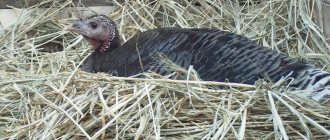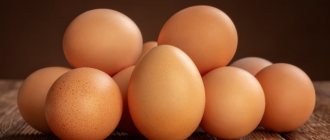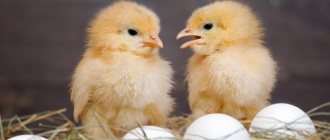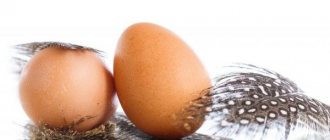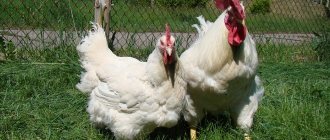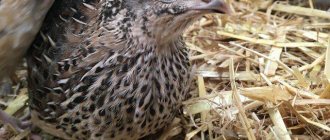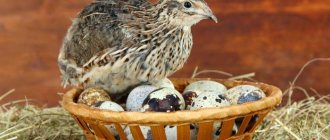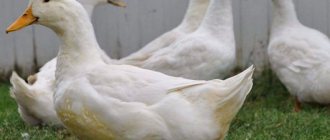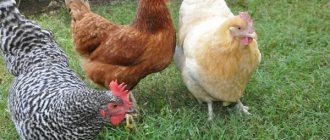Poultry farming » Ducks
0
4526
Article rating
Kira Stoletova
For poultry houses, in addition to materials suitable for sale (eggs, meat), poultry reproduction is also important. This is due to the fact that without a process such as oviposition, the number of birds will decrease sharply, and in the end, the profit from the sale of feathers and eggs will not cover the costs of raising poultry. The question of why ducks don’t lay eggs worries novice breeders more and more often.
When do ducks start laying eggs?
To avoid complications, you need to know well when ducks start laying eggs. During which months egg production is the highest, how should they be fed during this period and what additional measures should be taken. All this information will allow you to speed up and increase the productivity of laying hens as much as possible.
Complete diet
In order for individuals to develop properly, they need to be fed a nutritious and varied diet. If the turkey does not lay eggs, you may need to add more fresh greens or hay to the diet. To maintain all nutrients in the body, laying hens are given corn, eggshells and mixed feed. Also, if an Indian duck does not lay an egg, then a common reason for this is obesity.
It is important to feed birds in moderate amounts based on the age and size of the bird. Overfeeding with any product can lead to obesity; fat birds do not want to hatch eggs and move. It is periodically necessary to give Indian ducks supplements with a vitamin-mineral complex or vitamins A, C, D separately. To prevent the individuals from accumulating fat, the livestock should be released for active walks in the fresh air.
Why Indian ducks don’t lay eggs: the main reasons
There are periods when Muscovy ducks stop laying eggs. Even a young duck can stop laying eggs if she doesn't like the nest or isn't fed well.
To make a profit from breeding musk ducks, a farmer must understand the reasons for the lack of egg production and how to eliminate them.
Shedding
Twice a year, ducks change their plumage. Indo-ducks moult at the beginning of summer (May-June) and mid-autumn (late September).
Comfort is the main thing for a hen
At this time, females stop laying eggs. The period can last up to 2 months. After the end of the molt, the hen will begin to lay eggs.
Improper feeding
Another reason for the lack of eggs in the clutch is an unbalanced diet. An incorrectly formulated diet can affect not only the egg laying, but also its health.
Ducks are prohibited from giving:
- fresh bread;
- hot food;
- large pieces of food;
- sour and moldy food;
- dairy products that have not had time to sour well enough.
Sunflower cake or meal is often added to the food of Indian ducks. You should not overfeed birds with these products. Muscovy ducks can become obese, which will lead to decreased egg production.
Be sure to read:
How to quickly pluck a duck at home: preparation, methods and processing process
What needs to be taken into account during the egg-laying period of an Indian duck?
Indian ducks are practically omnivores. But the farmer needs to keep their diet varied if he wants to have a healthy brood of ducklings. It is better to give birds plant food. In summer, more fresh greens, and in winter - chopped hay.
Ducks must be given vitamins, minerals and salt in their food. We must not forget about clean water.
On average, one individual can drink up to 0.5 liters of water daily. In hot weather this amount increases.
Unsuitable nest
The nest where the chick hatches must be clean, comfortable, and safe. If the hen doesn’t like something, she won’t lay eggs.
The farmer should pay great attention to the process of making a nest:
- The nesting site should be darkened and hidden from prying eyes.
- The room should be dry and warm (air temperature not lower than +10 degrees).
- The nesting box must be safe - all cracks must be sealed so that rats and other small predators cannot get into the nest.
- Before placing a musky duck on a nesting site, it is necessary to treat the nest against insect pests and parasites.
Nest and wide perch
If a duck does not produce eggs, then you need to pay attention to its nest. Usually, starting from 6-8 months, Indian ducks can lay eggs. If this does not happen, the conditions for keeping the birds need to be improved. Perhaps the room is too cold. Indo-ducks are heat-loving creatures, and if the region where they are bred is characterized by frost, it is necessary to insulate the house. The nest itself should be located near the wall. The width of the perch should be at least 20-30 cm. If this rule is not followed, then even because of such a small thing, the pizzas may not lay eggs.
Please note that Indian ducks are very scrupulous in choosing a nest and its arrangement, so it is important to adhere to all the rules for installing perches and nests.
If the duck does not lay eggs, perhaps the ratio of nests to birds is unequal; the birds simply do not have enough space. In this case, it is better to make nests in different places; the ducks themselves will choose the right one for themselves.
The Indo-duck is not known for its egg production and when there is construction going on next to the poultry house or it is simply very noisy.
It should be taken into account that the place where an indo-duck has already laid eggs once should not be moved or re-equipped unnecessarily; after this, individuals may well leave the nest forever and begin to lay eggs in places not intended for this purpose.
How to find a good hen for the future
Muscovy duck eggs
Experienced farmers know that finding a good hen is quite difficult. The period of active egg production is a year and, if the offspring are not taken care of in advance, the breeder risks being left without young animals.
Be sure to read:
What needs to be done to get domestic ducks to start laying eggs?
The bird must be healthy. Only such a female is capable of raising strong ducklings, which will form the basis of the herd for the next year.
Key indicators of a healthy bird:
- wide, even keel;
- neat coral growths;
- growths of bright flowers (in dark ducks they may have slight pigmentation).
The hen is distinguished by a calm disposition and perseverance. If a farmer sees that a musk duck spends a lot of time on the nest, then this is an excellent candidate.
Behavior of Indian ducks in the poultry house
If you keep different birds in the same room, you need to make sure that they do not fight or compete with each other. Older and more arrogant birds can peck young animals. If the hen is pecked, then first of all she will refuse to hatch eggs. In a dirty and musty room, even calm individuals can fight among themselves. To prevent this from happening, birds need fresh air, a spacious enclosure and compliance with the light regime.
You cannot keep 10 birds on 3 m, they will be cramped. Each individual should have personal space. If the weather permits, it is better to let the birds go for a walk. During the winter season, you can hang distracting rags or things around the house. It is important to keep the premises clean and tidy. Every week you need to carry out general cleaning using disinfectants. It is also necessary to treat the walls from dust and other bacteria.
Creating favorable conditions
If the birds were flying and stopped, it means something happened. It is worth carefully preparing for the period when ducks begin to lay eggs. Favorable conditions will be required for the bird to begin preparing for the process:
- daylight hours for ducks last at least 10-16 hours;
- the nutritional value of feed is increased;
- the amount of feed is increased;
- install disinfectant baths with ash;
- build nests of brick or wood according to the number of hens;
- create an artificial reservoir (if there is no natural one).
Laying hens do not lay eggs if they are unsure of their own safety or are sick. Therefore, the ducks are periodically examined by a veterinarian.
First egg laying
Poultry farmers know that domestic and wild ducks behave differently, and therefore their egg production is different. Domestic birds do not have to fight for survival and get their own food, and therefore they can produce up to 120 eggs per year. On average, such ducks begin to give birth at the age of about 5 months. And if they start to lay eggs, the egg will appear constantly.
However, depending on certain factors, the time of the first oviposition may move significantly closer or further:
- Breed of duck. By nature, ducks of different breeds begin to lay eggs at different ages, so you should first ask the seller about this when the female of this species begins to give birth. If the females laid eggs well, it means that the egg production of the offspring will also be high.
- Presence of a drake. If there is no drake, the sexual development of young birds of this species is somewhat inhibited. More often than not, females that have laid eggs without a drake do not sit on the nest.
- Conditions of detention. In order for birds to fly on time, you need to keep them in comfortable conditions. The room should be dry, spacious and warm. It is also important to protect ducks from unnecessary noise.
- Health and way of life of the duck. An unhealthy duck will not be able to bear many offspring, so it is worth providing good nutrition, care and periodic medical examination. There should also be enough space for the duck to move around and be physically active.
Wild ducks, due to difficult living conditions, are capable of laying no more than 50-60 eggs per year, and sometimes the egg production of such ducks is only up to 20 eggs per year (that is, 1-2 egg layings). Unlike domestic ducks, which hatch their eggs for a long time, wild ducks do it quite quickly. Studies have shown that embryos of wild ducks develop much faster, and ducklings appear already around the 29th day of incubation. Also, the female and drake reach sexual maturity much earlier. This feature is directly related to survival.
How to help a duck become a good hen
“Maternal” qualities largely depend on when the ducks begin laying eggs for the first time. The earlier a bird begins to lay eggs, the more experience it gains in this matter. Accordingly, the bird, which at 7-8 months has already laid eggs more than once, knows perfectly well what to do with the eggs. And a duck that hatches its offspring for the first time may turn out to be a bad hen due to inexperience.
It happens that the bird flatly refuses to sit on the eggs. In this case, in no case should you put pressure on her or force her. It’s best to go for a trick, using the time-tested “grandmother’s” method. Ducks often refuse to lay eggs if for some reason there are few eggs in the nest. Therefore, the following method usually works : place so many eggs in the nest so that their number reaches about twenty pieces.
It happens that a hen pecks at the shell because she lacks calcium. In this case, you can place an egg with a secretion under the duck. To make it, you need to take an Indian duck testicle, carefully pierce it with a thin needle and pour out the contents, and carefully catch the liquid mustard inside. If a duck tastes such a treat once, it will give up the bad habit and begin to diligently sit on the nest.
Here are a few secrets that will help teach a duck to properly hatch chicks:
- the nest for hatching ducklings should be warm and cozy so that the hen feels comfortable;
- It is advisable to place a novice hen on the nest in the presence of more experienced “mothers”, so she will quickly understand what needs to be done;
- If a bird has few eggs in its nest, and there is nothing to put in it, you can use a trick by making special eggs from alabaster, the so-called dummies. The hen is unlikely to recognize the deception and will willingly sit on the nest. Contaminated artificial eggs should be replaced with new ones from time to time;
- The nest should be located in close proximity to the hen so that she can see it and willingly sit on it. Access to the nest must be free from all sides.
Indian women have different intelligence. Some hens are more intelligent , while others are not very savvy. Therefore, we must take it for granted that not all birds become good brood hens the first time. It should also be borne in mind that some ducks refuse to sit on the nest due to dulling of innate instincts caused by hormonal problems. This happens quite rarely, but such cases have been reported.
When is the best time for ducks to lay eggs?
Like wild ducks, domestic ducks lay eggs better in the spring, which is associated with a genetically inherent instinct to breed precisely in the warmest and most comfortable period for this. However, if domestic ducks are maintained in comfortable conditions all year round, they can expect offspring several times a year, including in winter. And the egg will have dimensions characteristic of the norm.
- On average, ducks lay 12-20 eggs three times a season. With each new clutch the number of eggs usually increases. The incubation period reaches a month. From the beginning of egg production, productivity will only increase.
- Some ducks may lay their eggs in someone else's nest. This phenomenon is quite common, so the owners of such birds have a wonderful opportunity to lay additional eggs for their ducks to hatch. This should not be done for those who are hatching for the first time, but for experienced ducks, you can increase the number of brood eggs to 20.
Many poultry farmers need to know what time ducks begin to lay eggs, how many months they should be, so as not to miss the appearance of the first eggs on the important day. This is usually at night, but the process can last until lunchtime. The time when ducks lay eggs requires peace and quiet in the barn; without this, not a single egg can be laid.
Duck egg production
Compared to other poultry, ducks are long-lived birds as they can live for about 20 years. However, they lose the ability to lay eggs by the age of 5–6 years. On average, each female can lay about 120 eggs per year. The egg production of these birds is influenced by the following factors:
- care of the owners for birds;
- breed;
- balanced diet;
- age of birds.
Important! Ducks usually lay eggs at 2–3 am.
To obtain chicks, it is necessary to collect eggs no later than 6 am in order to prevent them from hypothermia, which will make it impossible for the ducklings to be born.
At 6–8 months
As already stated, ducks begin laying eggs at about 6 months of age. When females reach this age, egg laying begins almost daily, and in the first month the pullets lay 20 eggs. In the 2nd and 3rd months (at the age of 7–8 months), the number of eggs will increase to 23–26 eggs per month.
At 8–10 months
From the beginning of egg production and further to 3 years, the productivity of ducks only increases if they are kept in suitable conditions. Therefore, at 8–10 months of age, females lay even more eggs than from the beginning of oviposition - up to 27 eggs per month.
Did you know? A huge number of ducks live in the pond of the central park in Dublin. During the military conflict that arose between Ireland and England in 1916, both sides stopped fighting in the park every day so that the caretaker could feed the birds living there.
At 10–12 months and older
The most productive, as practice shows, is the 2nd year of egg laying. It is during this period that the eggs are of the highest quality and the chicks from them are born healthy; moreover, they grow and develop faster. Subsequently, the egg production rate decreases by 5–10% every year and drops significantly by 5 years.
Why don't ducks lay eggs?
If these birds have stopped laying eggs, there may be many reasons. Most likely they lie in the incorrect conditions of keeping the laying hen:
- Incorrect temperature. In a room that is too cold, the bird feels unprotected, and the next egg laying will occur only when the temperature rises to the required level (minimum 12°C). Too high temperatures also do not allow birds to lay eggs, as they worsen the well-being of the birds and their health.
- Poor nutrition. You need to carefully monitor what the birds eat, feed in moderation and never overfeed. High quality feed is selected, grain and mixtures are used. Obese ducks cannot be forced to lay eggs.
- Lack of access to fresh air. In order for ducks to lay eggs well, the bird needs to be given proper exercise every day. A walk outside should last at least an hour.
Short daylight hours also affect laying hens.
Egg production will also be affected by the amount of light that birds receive during the day. A month before the expected ovipositor, you need to increase daylight hours using a lamp by 5-10 minutes every day. Adapted birds will lay eggs better. At night you can leave the light dim.
Preparing optimal conditions for egg laying
During this period, special attention must be paid to keeping ducks. The egg production of birds largely depends on proper preparation for oviposition. There are some conditions that must be met when ducks start laying eggs.
Preparing optimal conditions for egg laying
Complete and constant feeding
When do quails start laying eggs?
The feeding regime is established in advance of laying, approximately a month. Laying hens need to be fed 4 times a day, as during this period they need frequent meals. The more well-fed the birds are, the more eggs they will lay. The food should contain a variety of nutrients that are necessary for egg formation.
For a varied diet, the following are good:
- cake;
- bran;
- roots;
- milled wheat;
- crushed oats;
- corn.
It will be useful to start using succulent feed, created at home, during the period when ducks lay eggs. 1/5 of the diet can be greens - a mixture of nettles, clover, quinoa.
To gain weight, a duckling must consume feed containing animal fats. Low-fat cottage cheese, whey, bone and fish meal, boiled trimmings of meat, fish, and fish broth are suitable for this.
Increased daylight hours
This factor plays a fundamental role in the formation of the genital organs of birds. This must be remembered when discussing when ducks begin to lay eggs at home. The use of additional lighting will play a role here and will help the bird owner get the first eggs a little earlier.
The lighting level is increased little by little, in advance, before the start of masonry. Every day, the length of daylight should increase by no more than 20-30 minutes. Daylight hours can be extended in this way to 15 hours a day.
Light bulbs for lighting the room should be hung evenly, per square meter. The most commonly used bulbs are 700 lm. At night, electric lighting should be turned off, with the possible exception of low-power light bulbs.
Walking mode
When ducks start laying eggs, they need daily access to fresh air. Walks last 30-40 minutes. It is especially good if they walk near a pond.
Walking ducks
Proper placement and conditions of detention
During the period of laying eggs, drakes must be separated from females. This is done because the male’s courtship disturbs the female. In exceptional cases, a laying hen may completely “forget” about the clutch.
In the room where ducks lay eggs, their density must be taken into account. There should not be more than 3 laying hens per 1 sq. A denser population will make it difficult for the birds to move; they will interfere with each other when feeding.
If there is a large number of birds, they will be placed in specially fenced off sections. One such compartment is designed for approximately 25-30 individuals. In order for the fertilization of eggs to be high, 5-6 drakes are needed per such plot. It must be remembered that an old drake is not suitable for fertilization.
How to make a duck lay eggs
First of all, you will need to eliminate all the reasons listed in the previous paragraph. If the owner wants the birds to lay eggs well, he is obliged to provide the birds with comprehensive nutrition and access to a reservoir, increase daylight hours, provide the birds with a walk every day, and equip the premises with effective ventilation.
If this does not help, there may be a health problem; laying hens need special care. You need to pay attention to the color of the legs and beak: it should be bright orange. Often health problems manifest themselves in poor nutrition and infrequent fluid intake. If you notice any abnormalities, contact your veterinarian and undergo a course of immunotherapy.
Sometimes, when ducks start laying eggs, you will find that some eggs appear without shells. If a duck lays such an egg, this is a clear indication that its body lacks vitamins and needs to be corrected urgently.
Beginning of egg laying
Depending on the breed and conditions of detention, ducks reach sexual maturity at 140-160 days. The greatest fertility of a laying hen occurs in the second year of life. Under optimal conditions, the bird will begin laying one egg every day. Then its egg production gradually decreases. Depending on the age at which ducks begin to lay eggs, the egg-laying period lasts up to 5-6 years. At the same time, the normal life of a bird sometimes lasts up to 19-20 years.
When the ducks start laying eggs
In addition to age, duck egg production depends on housing and feeding conditions. Poultry farmers know well that it is unacceptable to move laying hens from their place of residence until the end of the laying period. The room intended for laying hens must be spacious, warm, dry, and insulated from excessive noise. A change in diet will also have a negative impact on egg laying - unexpected changes in feeding can significantly delay the onset of egg laying.
Incubation
Hatching lasts about 4 weeks. During this time, the poultry farmer provides the ducks with maximum comfort. At this time, the laying duck rarely gets up from the nest and does not move most of the time. Sometimes birds stop eating for a few days after laying, this is normal, but they need extra supervision during this period.
After some time, the egg begins to crack, and the first duckling hatches from it. All ducklings do not hatch at the same time, so immediately after the birth of a new duckling, it should be removed from its mother until all the others have hatched.
There are several reasons why Indian ducks or other types of ducks do not lay eggs. Egg and egg-meat duck breeds produce eggs that are not inferior in nutritional value and healthiness to chicken eggs. This is a profitable type of business. But when the productivity of ducks decreases, it ceases to pay for itself. From this article you will learn about why ducks stopped laying eggs and what measures should be implemented to resume this process.
Causes of poor egg production
To avoid problems with egg production, you need to know when ducks start laying eggs and why they may not lay eggs.
If a duck does not produce eggs, you can pay attention to its nest, as well as its living conditions. The room may be too cold
Factors influencing the process:
- bird breed;
- type of bird (wild or domestic);
- influence of the season;
- the presence of a drake;
- conditions of detention;
- poultry health.
The faster the hens begin to hatch their offspring, the faster the breeder will make a profit.
Difference Between Species
Wild and domestic breeds behave differently. Their living conditions are radically different.
Wild animals constantly have to fight for survival, look for food, and fly from place to place. Pets live stress-free, well-fed and warm.
Ducks lay eggs at different times, and their number of eggs differs. On average, domestic breeds begin laying eggs at 150 days of age. Their productivity reaches 120-150 units. in year. Based on these data, the poultry farmer is able to calculate the growth rate of the livestock.
Seasonality factor
Egg production in wild and domestic breeds varies by month. Wild breeds lay eggs in the spring.
This usually occurs from April to May, when it is warm outside and the eggs are safe. The period is associated with the fact that birds will need to not only raise their offspring, but also teach them the basic rules of survival: find food, fly in a flock. In the fall, the babies will be stronger and will be able to cover long distances when flying to warmer climes.
Egg production of ducks at home begins in winter. The temperature in the poultry house is always favorable for laying; females are not afraid of the cold. Therefore, a laying hen can lay 9-10 eggs and produce them every day.
The number of clutches depends on the age of the hen. The offspring appear 20 days after the start of incubation.
Presence of a drake
In the first 6-7 years, duck egg production is high. There should be a drake for every 5 females. This is a mandatory condition that must be met in order for ducks to lay eggs regularly. The presence of the drake ensures the fertilization of the eggs. If there is no male, the eggs will be empty. His health must be impeccable.
Some breeds of females sense pacifiers and throw them out of the nest. If the female gives eggs without a drake, then she will not sit on the nest at all.
Breed influence
Ducks of different breeds begin to lay eggs at different times (monthly), and their productivity differs. When choosing birds, a breeder should pay great attention to this issue if he is interested in increasing the number of his flock or making a profit from the sale of eggs.
A musk duck will not lay eggs if basic hygiene rules are not followed in the premises and the house is not ventilated
Muscovy birds begin laying eggs several months later than others. Indo-ducks have poorly developed maternal instinct. Factors like these are worth considering.
If the selected females have good productivity, then their offspring will have the same qualities.
Influence of living conditions
In order for laying hens to produce the required amount of offspring, they are kept in good conditions, provided with high-quality feed and protected from stress.
A sick and nervous bird will not produce good offspring. Such individuals lay eggs worse. Problems are always reflected in appearance. If you carefully examine the herd, you will be able to detect the problem almost immediately.
Reasons for decreased duck productivity
The productivity of one laying hen per year ranges from 110 to 250 eggs weighing up to 90 grams. If this indicator is rapidly falling, it is important to figure out in time what caused the negative trend.
There are several reasons why Indian ducks do not give birth:
- an uncomfortable nest;
- unbalanced diet;
- violation of duck keeping standards;
- molting;
- unsanitary conditions in the poultry house;
- age of birds;
- conflicts in the pack.
Almost all situations are the result of the owner’s oversight and negligence in keeping ducks. To resolve problems, it is enough to adjust your actions and show more attention.
Let's look at each case in detail.
Bird maturation
A distinctive feature of musk ducks is that the drakes reach puberty later.
A young female at the age of 7 months is already able to lay an egg
Females are ready to reproduce offspring already on the 200th day of life (6-7 months).
When breeding Indian ducks, this point should be taken into account. Muscovy ducks can give birth twice a year. If a farmer wants to get spring offspring, then he should choose a drake 1.5 months older.
The optimal ratio of ducks (for maximum productivity) is one male to four females.
The duck doesn't like the nest
In order to carry out regular egg laying, it is important for the laying hen to feel peace, coziness and comfort.
A wooden box with sides is suitable as a nest. Hay or soft dry grass is placed at the bottom. You will find more information in the article “Making a nest for Indian ducks with your own hands.”
Make sure the litter remains clean at all times. Change it in a timely manner and exclude wet food from the duck’s diet during egg laying. Otherwise, the bird will smear the eggs and bedding with liquid feces.
Muscovy ducks, like other breeds, do not tolerate the presence of strangers during the egg-laying period: animals, adult birds and ducklings. Therefore, position the nest so that access to it by other yard residents or strangers is limited.
Avoid drafts and sudden temperature changes. In the cold, the duck feels unprotected, and the heat makes it apathetic and lethargic. Therefore, the presence of ventilation all year round and heating in the winter months is mandatory.
Eliminate loud noises that frighten the hen.
Unbalanced diet
Lack or deficiency of nutrients provokes diseases, epidemics and even mass mortality in ducks. A poor diet and low-quality feed are common reasons why ducks do not lay eggs.
The healthy duck menu includes:
- fresh chopped herbs;
- high-quality compound feed, which is described in the article “Recipes for preparing compound feed for ducks and ducklings with your own hands”;
- homemade mash based on cereals;
- boiled chopped vegetables;
- cottage cheese;
- fish flour;
- boiled meat;
- fresh water: 0.5 l per day for one individual;
- mineral supplements, including calcium.
Make sure the food is fresh and well chopped.
The other extreme in organizing nutrition is overfeeding. Indo-ducks do not lay eggs if they are overweight. This also applies to other egg-laying duck breeds.
How to increase the egg production of a duck?
To increase the productivity of poultry, you need to:
- Monitor the health of both laying hens and drakes. An indicator of their health is the bright orange color of their legs and beak, as well as a good appetite. If your ducks are not drinking or eating enough, you should contact your veterinarian.
- Along with regular food (which should include tops of root crops, potato peelings, soaked barley, greens), use various vitamin supplements for large birds.
- These birds are very sensitive to relocation, which is stressful for them. Therefore, to prevent ducks’ egg production from decreasing, it is better to save them from “moving.”
- Most breeds of domestic ducks cannot live peacefully with representatives of another breed, therefore, in order to avoid conflicts between individuals, which are also stressful for them and can reduce the level of egg production, it is better not to keep representatives of different breeds in the same place.
Ducks have long occupied a leading position among other poultry due to the fact that they reach quite large sizes, live a long time and give good offspring. One such poultry lays on average about 120 eggs per year. Their egg production is influenced by factors such as nutrition, comfortable living conditions, breed, age, etc. If you want to increase the egg production level of birds, provide them with a warm home, daily walks in the fresh air, access to water and a balanced diet.
Uncomfortable conditions
Ducks do not lay eggs if they experience inconvenience in their daily lives. These are unpretentious birds, so providing them with decent living conditions is a completely feasible task for any breeder.
The main factors for the level of comfort: moderate humidity, temperature, and the duration of daylight hours indoors - 12-14 hours.
The built-in ventilation system combats high air humidity and musty odors inside the poultry house.
The optimal temperature range is from +16° to +22°C.
The cramped environment is another reason why the number of eggs has decreased. The optimal area for bird population in a room is three birds per square meter.
Keeping the duck house clean is a prerequisite for duck productivity. The room is cleaned and bedding is replaced once or twice a week. Disinfect the aviary at the end of each bird-raising season.
If the Indian does not want to lay eggs: tips
Indian ducks are quite capricious birds. Any stressful situation can cause the hen to stop laying eggs.
The farmer must organize the life of the birds so that there is no room for any shocks:
- Under no circumstances should you touch a Muscovy duck's nest. Even a slight movement can cause the duck to no longer sit on the nest and stop laying eggs.
- For birds of this breed, it is important to have clean, fresh water in the drinking bowl.
- Muscovy ducks are very clean. They will not start racing in a dirty, drafty room.
- Indian women love space. The optimal number of birds in the room: 3 ducks per 1 m2.
Molting stage
A duck that is going through a molt is unable to fly or lay eggs. During this period, the drake also weakens and leaves the nesting site of its partner.
In laying hens, the process of changing feathers begins after laying. The time for complete renewal of plumage lasts approximately two months. The period may be extended if there are other unfavorable factors in keeping poultry.
What to do: be patient and provide the duck with comfortable conditions in which it will survive this difficult period.
Stressful situations
If the poultry yard is inhabited by birds of different breeds, several drakes or individuals of different ages, conflicts between them are possible. Most often, in fights, males defend their territory or measure their strength in order to win the favor of the female. There are frequent cases when young birds attack an old individual or adult birds attack babies.
Fights lead to more than just physical injuries. They provoke stress even in birds that do not take part in the conflict. In an unfavorable psychological environment, ducks, feeling anxious, will not lay eggs.
This reason can be eliminated by placing the birds in separate rooms and organizing their walking at different times. It is important to isolate the laying hens from other birds and provide them with complete rest.
Other reasons for the reduction in the number of eggs
Physical immaturity or old age of ducks is one of the reasons why your pets do not produce eggs. Ducks that are six months old are laying eggs. The age of “retirement” is 5-6 years. During these intervals, egg production rates are usually at their maximum level.
The winter months are considered the most unproductive for laying ducks. In addition to the fact that representatives of duck breeds do not tolerate cold well, they run the risk of frostbitten paws. Therefore, maintaining an optimal temperature regime (not lower than +16°) in the poultry house is mandatory.
Finding out why the Indian duck does not lay eggs in the spring is not difficult. An experienced breeder knows that this breed of ducks needs more time to adapt to the new season. As a rule, the musky duck begins laying a month and a half later than other ducks. The second reason is age immaturity. In both cases, you should wait a little.
If you found this article useful, please like it, leave comments and share useful information with your friends on social networks.
- Author: Maria Sukhorukikh
Rate this article:
- 5
- 4
- 3
- 2
- 1
(0 votes, average: 0 out of 5)
Share with your friends!
How to increase the number of eggs
The quantity depends on when turkey ducks start laying eggs at home. If they begin to lay eggs as early as six months, it means they are kept in good conditions. Different hens have different egg production : there are record-breaking ducks (in such cases, the owners sometimes don’t even know where to put the chicks), and there are birds with fairly average indicators. Most often this is due to heredity, but living conditions also play a big role. You can increase the number of eggs in different ways, for example:
- Enrich the daily nutritional diet of birds with vitamin and mineral supplements;
- Increase the number of laying hens, for example, buy mature ducks by advertising in the newspaper (on social networks);
- Maintain suitable temperature and humidity in the room where poultry is kept;
- Improve other conditions of detention. For example, you can move the hens to a larger room and give each of them more space for a nest.
These little tricks will help significantly increase egg production. At the moment, turkey eggs are not in great demand in the agricultural market. This is due to the common misconception that they can be carriers of salmonellosis. However, this is just a popular “myth”. Muscovy duck eggs are not much different from chicken eggs, except that the taste is slightly different. In addition, they do not have a specific odor , which often comes from duck and goose eggs. Therefore, it is undoubtedly worth working to improve egg production.
If you wish, if you have two or three serviceable laying hens on your farm, you can completely refuse to buy eggs in the store and provide a family of four to five people with a valuable product. If the livestock is large, you need to select several of the most outstanding laying hens and focus on them, and raise the rest for meat. Usually in each herd there are at least two or three such “record holders”. When purchasing turkey ducks at the market, you should ask the seller about the bird’s egg production.
